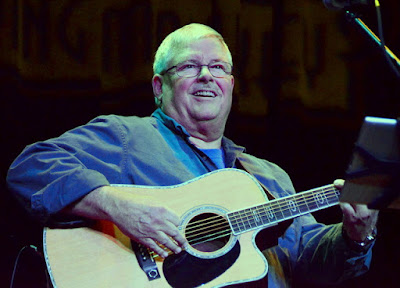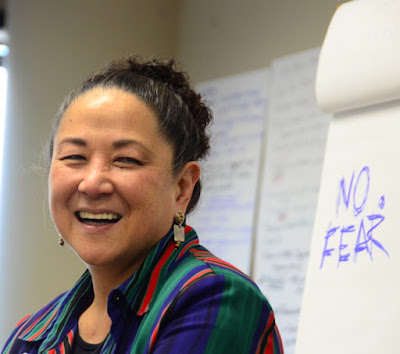In
Dare
Me (Back Bay Books, 2013, 320 pp, $1131/9.99), Megan Abbott
took me into a world I had never imagined, introduced me to people I
only have known peripherally, told a dark, and often frightening, story of love, hate, and betrayal. Finally, I left with less care for
the people involved than they deserve and in a place I probably won't
visit again. Nevertheless, Abbott's elusive, almost ambiguous prose
and driving plot held me, as a reader, until the tumultuous end of
this dark, throbbing, mysterious novel.
The story is set in middle America,
that is, it could be anywhere there's a high school and a cheer
squad. It's narrated by Addy Hanlon, an attractive, athletic high school
junior on her school's cheer squad. Beth Cassidy, her best frenemy,
for these girls are nothing if not bitter rivals as well as closest
friends, is captain of this year's squad until their new coach,
Collette French, is introduced and immediately fires her as captain. There ensues
a season of training for the final game, to which a recruiter for the
regional finals in cheer competition is rumored to be coming, as the
team's fortunes rise and fall during practice, with its tough lessons
and frequent injuries. French also opens her home to the team, where
they gather to smoke and, at least some of them, to drink, too. To
complicate matters, members of the team as well as the coach herself,
are attracted to a military recruiting team stationed in the lobby of
the high school. This over-heated mixture is a certain recipe for
troubles to come.
As a former high school teacher, I'm
well aware that high school students have always inhabited a world
quite different from the one which their parents would like to
imagine. Here the world of the cheer squad seems, at least to me, to
be hyper-sexualized and intensely inner-directed. The outside world
of high school students, things like classes, study, interests other
than, in this instance, the cheer squad, drugs, dieting, and boys,
disappear within the friendships, rivalries, diets, and loves of the
squad members themselves, creating a totally exclusive group. Even,
maybe especially, parents are almost completely absent. Large
portions of the tensions in the plot are communicated in text
messages, which, unless the plot demands it, are never seen by anyone
but the recipient.
Abbot's language is direct, realistic,
graphic, explicit, and, for some, may be shocking. I've been retired
from teaching for nearly twenty years, and schools, by any measure,
have changed since I last spent much time in them. But I suspect,
even though there's been lots of change, that much went on there
that I blissfully ignored. Teenagers, no matter how much we
think we know and understand them, exist in a parallel world most of
us can't, and probably don't want to, fully share. Abbott places
herself within that world with a high degree of verisimilitude. I'm
not certain who the audience for
Dare
Me might be. When I was an
active English teacher, I read a good deal of what's now called
“Young Adult” fiction, much of which dealt with the real problems
of adolescence. Writers like Judy Blume and Chris Crutcher often
nailed issues and character with startling effect. Writer and
critic Gillian Flynn has said, that Megan Abbott “has created a
mesmerizing, modern portrait of teenage life today: Brutal crushes,
competing allegiances and first-bloom sensuality, all magnified by
the rush and crush of technology." While this could be labeled at "Young Adult," it might just as well be called "Parent Education," or just plain, good writing.
Megan Abbott
Megan Abbott is the Edgar®-winning author of the novels
Queenpin,
The Song Is You,
Die a Little, and her latest,
The
Fever, which was chosen as one of the Best Books of the Summer by
the New York Times, People Magazine and Entertainment Weekly and one
of the Best Books of the Year by Amazon, National Public Radio, the
Boston Globe and the Los Angeles Times. Her writing has appeared in
the New York Times, Salon, the Guardian, Wall Street Journal, the Los
Angeles Times Magazine, The Believer and the Los Angeles Review of
Books. Born in the Detroit area, she graduated from the University of
Michigan and received her Ph.D. in English and American literature
from New York University. She has taught at NYU, the State University
of New York and the New School University. In 2013-14, she served as
the John Grisham Writer in Residence at Ole Miss. (lightly adapted
from Megan Abbott's
web
site)
Dare
Me by
Megan Abbott (Back Bay Books, 2013, 320 pp, $1131/9.99) is a problem
novel about adolescent girls on a cheer team in a contemporary
American high school. It tells the story of the girls on the team,
their coach, and the deeply conflicting behavior and motives of many
of them. It features graphic behavior and deep psychological trauma,
which may be characteristic of behavior at some level in today's
schools. As with many of today's books exploring adolescent
life, many parents might prefer that their children not read
Dare
Me. On the other hand, for both
children and their parents, reading
Dare Me
may open the opportunities for further teaching and learning about
how to function in the difficult and often confusing world we
inhabit. Books like these are best approached in an environment of
exploration and discovery. The book is distinguished by Abbott's fine
writing and vivid use of language some might find offensive.
Nevertheless reading it could provide insight to many adolescents and
their parents. Additionally, the story features taut and gripping
writing throughout. I borrowed the book from my local public library.

















































